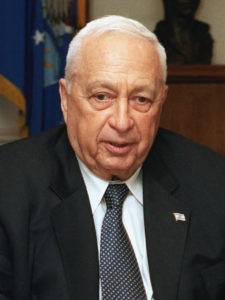“Ariel Sharon was a great architect and outstanding defender of his state.”
That’s how Israel’s current President, and once political rival, Shimon Peres described one of Israel’s last founding leaders who passed away this Saturday, after eight years in a coma.
As a controversial figure around the world, Sharon was one of the most interesting politicians the State of Israel has ever known. He fought in every war Israel had until the 80s, then became the Minister of Defense during the 1982 Lebanon War.
Many Arabs forever after called him the Butcher of Beirut, because of his part in the Sabra and Shatila Massacre during that war. The Kahan Commission, an Israeli investigation into the massacre, found Sharon indirectly responsible for allowing the Christian Lebanese militia to kill thousands of Palestinian civilians in the villages of Sabra and Shatila. Sharon was also accused of deceiving Prime Minister Begin as to the Israeli Army’s intentions, and leading a full-on offensive into Beirut at the cost of thousands of Israeli lives.
Yet somehow, with a mix of charisma and deep strategic understanding of Israel’s security needs, Sharon became a major player in Israeli politics again after less than a decade on the sidelines. Climbing the ranks of the conservative Likud party, he completed his transformation from political outcast to mainstream politician by beating Ehud Barak in the Israeli elections following the failed Camp David talks of 2000. Sharon won by a landslide, affirming the notion that Israelis had forgiven him for his part in the Lebanon War. They also believed in his ability to defend Israel from what would soon be called the Second Intifada just started by the Palestinians. Israelis wanted him to be the bulldozer that would fortify Israel’s security and overcome terror. And he did just that.
For younger Israelis like myself, Sharon’s image was not stained by things that happened before we were born. For us, he was Israel’s old grandfather (“Saba”); who was there for Israel’s establishment and who knows first-hand how to deal with our worst enemies. He was determined to keep Israel safe in the days where a bus ride turned into a war zone. Sharon was the powerful leader who initiated “Operation Defensive Shield,” in which Israel again conquered the West Bank. He spearheaded the building of the separation barrier between Israel and the West Bank which, despite its international controversy, has saved countless Israeli lives.
The disengagement from Gaza was his final project. It helped him gain worldwide support, but it turned the settlers, once his biggest supporters, into his enemies. Sharon, as Minister of Agriculture in 1970s, was one of the first politicians to openly support and finance the settlements. But some say he finally understood, at an old age, why peace with the Palestinians meant a safer Israel. Others argued that Sharon caved to political pressure, that he knew the Gaza Strip would become a constant threat to Israel’s major population centers, and that it would prove that Israel should not similarly withdraw from the West Bank. Many Israelis still cite the Gush Katif withdrawal from Gaza as an example of why any peace with the Palestinians that includes a full withdrawal from the West Bank can not be considered a viable option to keep Israel safe.
Sharon’s character was unique in the political realm of the Jewish State. He was never afraid to say what on his mind— an old-school style of politician. He will be remembered as one of the last giants of the nation, together with David Ben-Gurion, Menahem Begin, Golda Meir, Yitzhak Rabin, and Shimon Peres.
When Prime Minister Benjamin Netanyahu was born, Ariel Sharon—who never went to officer’s school—was already a company commander leading dozens of soldiers in Israel’s War of Independence. He will be remembered as one of the most admired and controversial leaders in the history of the State of Israel.
Naor Bitton is an Israeli Fulbright scholar in the Humphrey School of Public Affairs in the University of Minnesota.



